Lushoto, Tanzania
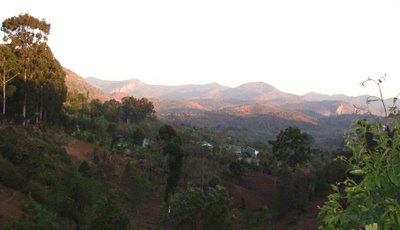 When I first came to
When I first came to
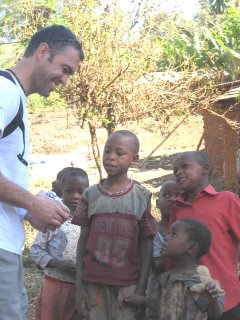 My bi-weekly adventure treks have dwindled and my hours of labor have gone from a high number to an even higher number. Sneaking off is going to be tougher as many of the project changes I have been planning go into implementation. The good news is that I will start to see some fruit from nearly a half-year of toil. The admin and finance of an AIDS care and treatment project has been a major challenge both professionally and personally but, at the request of my girlfriend, I will not focus on the pitfalls of my job but spend more time thinking what a cool opportunity this is. As for the bad stuff, whatever happens happens. I will make sure I continue to enjoy this experience as I have until now.
My bi-weekly adventure treks have dwindled and my hours of labor have gone from a high number to an even higher number. Sneaking off is going to be tougher as many of the project changes I have been planning go into implementation. The good news is that I will start to see some fruit from nearly a half-year of toil. The admin and finance of an AIDS care and treatment project has been a major challenge both professionally and personally but, at the request of my girlfriend, I will not focus on the pitfalls of my job but spend more time thinking what a cool opportunity this is. As for the bad stuff, whatever happens happens. I will make sure I continue to enjoy this experience as I have until now.
Lushoto was a loose collection of very small Tanzanian villages until the arrival of the Germans in the late 1800's. Because the higher altitude and cooler climate were closer to that of native Germany, the Germans established an outpost there which grew fairly rapidly. For a while it was even targeted to be the German capital in Tanganyika (as it was known then).
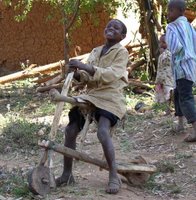 To get there we chose to take the bus rather than drive since both our vehicles are of questionable reliability for longer excursions. The “deluxe” bus here is like a beat up Greyhound but nicer than cheaper alternatives. It has the loo in the back and they even come by with a bottle of water once you’re on the road. The main
To get there we chose to take the bus rather than drive since both our vehicles are of questionable reliability for longer excursions. The “deluxe” bus here is like a beat up Greyhound but nicer than cheaper alternatives. It has the loo in the back and they even come by with a bottle of water once you’re on the road. The main 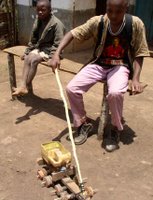 advantage to the more expensive option, however, is that you have a better chance of not breaking down (or so the theory goes). Most bus companies have crappy buses that fall apart in the middle of nowhere. You end up sitting on the side of the road in the hot sun watching a bunch of resourceful Tanzanian guys attempt to jerry rig the beast back to life – sometimes successfully, sometimes not. Meanwhile stranded passengers try to flag down passing vehicles to get some sort of transport on towards their destination. Whities (wazungu) have a distinct advantage since there’s a greater chance that we’ll give them money.
advantage to the more expensive option, however, is that you have a better chance of not breaking down (or so the theory goes). Most bus companies have crappy buses that fall apart in the middle of nowhere. You end up sitting on the side of the road in the hot sun watching a bunch of resourceful Tanzanian guys attempt to jerry rig the beast back to life – sometimes successfully, sometimes not. Meanwhile stranded passengers try to flag down passing vehicles to get some sort of transport on towards their destination. Whities (wazungu) have a distinct advantage since there’s a greater chance that we’ll give them money.
After an uneventful but pretty drive, we made it to Lushoto. Priya had made reservations in a convent/hostel. Several years ago I stayed in a monastery/hostel in
I tend to like this sort of non-traditional accommodation and this one turned out to be great. St. Eugene’s is in the
The sisters run a very clean place and even produce their own cheese, jam, banana wine and peanut butter. The higher altitude was very nice given that Dar is heating up as summer sets in. At night it was even cool enough to merit wearing a jacket (which I didn’t have).
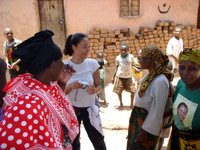 The nuns have a good working relationship with a hike guide named Kibwana. When we checked in, we communicated our interest in having him show us around. So Saturday morning, after our scrambled eggs, bread, jam and coffee, Kibwana was waiting for us with a driver to take us to the trailhead. His English was decent and the day ended up being a pleasant mixture of English and Swahili. I say pleasant because, while it’s fun to mix it up in my new language, it can be exhausting and it’s nice to be able to bail a lot and fall back into my native tongue.
The nuns have a good working relationship with a hike guide named Kibwana. When we checked in, we communicated our interest in having him show us around. So Saturday morning, after our scrambled eggs, bread, jam and coffee, Kibwana was waiting for us with a driver to take us to the trailhead. His English was decent and the day ended up being a pleasant mixture of English and Swahili. I say pleasant because, while it’s fun to mix it up in my new language, it can be exhausting and it’s nice to be able to bail a lot and fall back into my native tongue.
There are a number of guides in the Lushoto area and it’s going to gradually grow in popularity. As in the case of Kilimanjaro, you have good ones and bad ones. The sisters are very business savvy and are particular about those with whom they do business. Kibwana is not only a smart and trustworthy guide, he happens to be the grandson of a tribal chief. Our hike into the hills took us through his village. I have to say, it was one of the coolest Tanzanian experiences yet.
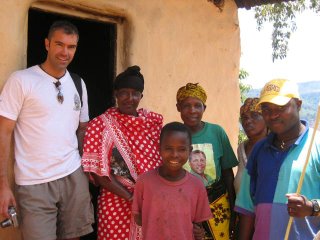
Kibwana introduced us to his grandfather’s four wives, dozens of uncles, aunts, siblings, etc. Basically the entire village is family. We were welcomed with considerable enthusiasm and the normally shy Tanzanians were working it in front of the camera. We were even invited into one of their tiny homes which is not very common.
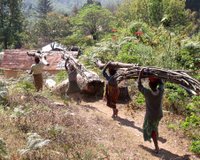 We passed many girls heading downhill with tons of wood loaded on their heads. Pretty amazing to see what these ladies/girls can pack on their heads. Because some of them were from Kibwana’s village, they’d occasionally stop and chat. It’s just weird how different it is for these kids to spend their Saturdays working their asses off while most American families can’t get their kids to take out the trash.
We passed many girls heading downhill with tons of wood loaded on their heads. Pretty amazing to see what these ladies/girls can pack on their heads. Because some of them were from Kibwana’s village, they’d occasionally stop and chat. It’s just weird how different it is for these kids to spend their Saturdays working their asses off while most American families can’t get their kids to take out the trash. 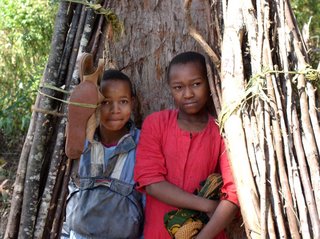 These kids don’t ask questions. They just do it. They giggle, sing, talk, etc. and they don’t seem bothered by the whole thing.
These kids don’t ask questions. They just do it. They giggle, sing, talk, etc. and they don’t seem bothered by the whole thing.The moon was pretty much full and the cool evening was such a nice break from the
 The next morning we caught our taxi back to the bus station. We sat in the bus for a while and then felt the thing rocking back and forth. Yes, even the “deluxe” bus was ailing. The rocking was caused by people trying to push-start our fully loaded bus. When vehicles stall here, it’s amazing to see people drop what they’re doing to help push. In the case of a huge bus, the nearby café pretty much emptied as dozens rallied to get us rolling. Sure enough, it worked and we were off to Dar.
The next morning we caught our taxi back to the bus station. We sat in the bus for a while and then felt the thing rocking back and forth. Yes, even the “deluxe” bus was ailing. The rocking was caused by people trying to push-start our fully loaded bus. When vehicles stall here, it’s amazing to see people drop what they’re doing to help push. In the case of a huge bus, the nearby café pretty much emptied as dozens rallied to get us rolling. Sure enough, it worked and we were off to Dar.

0 Comments:
Post a Comment
<< Home